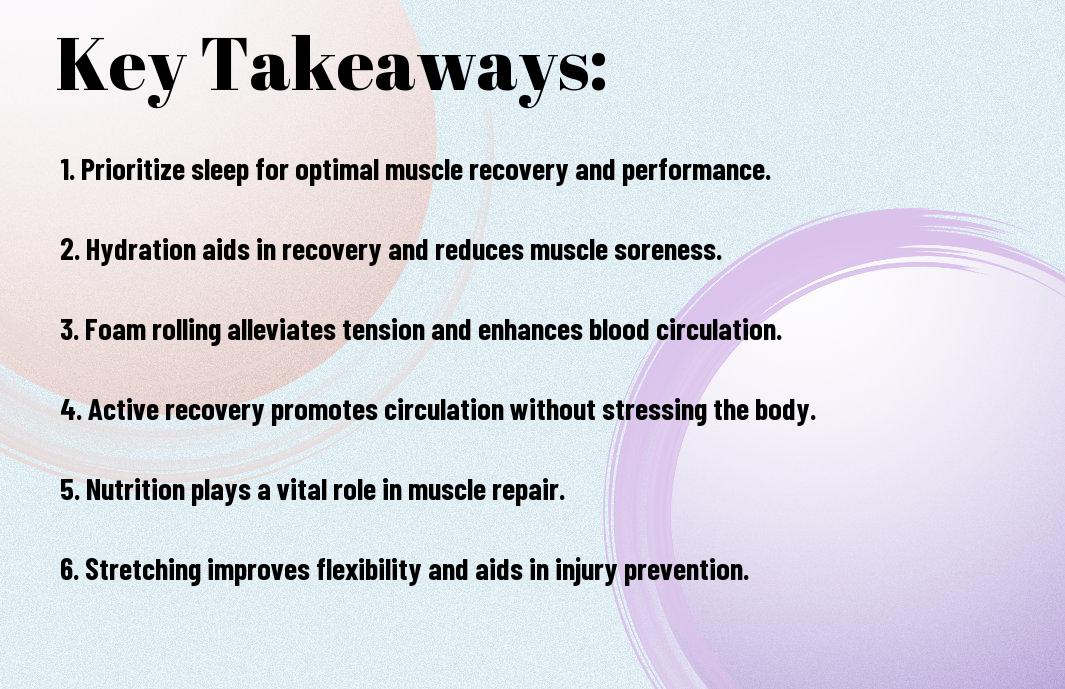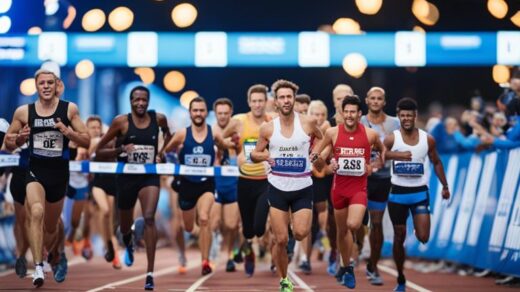With the ever-increasing demands placed on your body as an athlete, understanding effective recovery techniques is necessary for optimizing performance and preventing injuries. You may find that incorporating the right strategies into your routine can significantly enhance your overall recovery process. From hydration and nutrition to rest and innovative therapies, this post will explore the best methods available to help you bounce back faster, feel rejuvenated, and ultimately achieve your athletic goals.
Key Takeaways:
- Hydration is imperative for effective recovery, helping to replenish lost fluids and enhance overall performance.
- Nutrition plays a significant role; consuming a balanced intake of carbohydrates and proteins post-exercise aids muscle repair and energy restoration.
- Rest and sleep are vital components, allowing the body to recover and repair itself, improving both physical and mental health.
- Active recovery, such as low-intensity exercises, can promote circulation and reduce soreness, facilitating the recovery process.
- Stretching and mobility work can enhance flexibility and prevent injuries, contributing to an athlete’s long-term performance.

The Importance of Recovery
Before you push your limits in training or competition, it’s crucial to recognize that recovery plays a vital role in your overall performance. Adequate recovery not only restores your muscle function but also enhances your strength, reduces the risk of injury, and optimizes your mental readiness. By prioritizing recovery, you create a sustainable approach to reaching your athletic goals, allowing your body to adapt and improve over time.
Understanding Muscle Repair
Before venturing into intense workouts again, you should understand that muscle repair is a complex process that occurs after exertion. During your training, muscle fibers undergo stress, and they need time to recover and rebuild stronger. This restorative phase is where the building blocks of protein synthesis come into play, making it important for you to allow your muscles sufficient time to repair to enhance your performance.
Mental Recovery: The Overlooked Aspect
Before you underestimate the impact of mental recovery, consider that your mind plays an equally important role in your overall performance. Just as your body requires time to recuperate, your mental state also needs rest to optimize focus, motivation, and resilience. By incorporating techniques for mental recovery, you can enhance your decision-making, reduce stress, and maintain a positive mindset while competing or training.
Importance of mental recovery cannot be overstated; it is crucial for maintaining peak performance. Engaging in activities that promote relaxation, such as mindfulness, meditation, or even light recreational activities, can significantly improve your mental clarity. Ensuring that you allocate time for mental recovery helps you combat the pressures of competition, leading to a more balanced and effective approach to your athletic pursuits. By recognizing and valuing both physical and mental recovery, you enhance your overall performance and well-being.

Active Recovery Techniques
The best active recovery techniques can enhance your recovery process and improve overall performance. Implementing low-intensity exercise and stretching can keep your body engaged while facilitating the healing process. These strategies focus on blood circulation, muscle relaxation, and mobility—all vital for maintaining your athletic edge.
Low-Intensity Exercise
After intense training or competition, engaging in low-intensity exercises like walking, cycling, or swimming can greatly benefit your recovery. These activities encourage blood flow, reducing muscle soreness while allowing your body to maintain its active state without overexertion. You can easily incorporate these practices into your routine to support recovery.
Stretching and Mobility Work
To enhance flexibility and prevent stiffness, incorporating stretching and mobility exercises into your recovery routine is necessary. This practice not only aids in muscle relaxation but also supports joint function, enabling better movement patterns in your training sessions.
Hence, integrating dynamic stretches, foam rolling, and targeted mobility drills can significantly improve your recovery. These techniques foster greater range of motion, reduce muscle tension, and promote overall body awareness. By prioritizing these activities, you are setting the stage for improved performance and longevity in your athletic pursuits.
Nutrition for Optimal Recovery
Once again, the importance of nutrition in your recovery process cannot be overstated. Properly fueling your body with the right foods post-exercise can enhance muscle repair, replenish energy stores, and reduce inflammation. Incorporating a balanced diet that includes proteins, carbohydrates, and healthy fats will facilitate your recovery, enabling you to train harder and perform better in your next workout. By prioritizing your nutritional needs, you can optimize your athletic performance and speed up recovery times.
Key Nutrients for Muscle Repair
Among the most crucial nutrients for muscle repair are proteins, as they provide the building blocks needed for muscle recovery and growth. Incorporating lean meats, dairy products, legumes, and plant-based proteins into your post-workout meals will ensure optimal muscle synthesis and reduce soreness. Additionally, including vitamins and minerals—such as vitamin C, vitamin D, and zinc—will support your immune system and overall recovery process.
Hydration Strategies
Any athlete knows that staying hydrated is vital for peak performance and recovery. Proper hydration ensures that your body functions optimally, helping to transport nutrients to your muscles while flushing out toxins. Furthermore, drinking adequate amounts of water aids in regulating body temperature and can reduce muscle cramps. To enhance your recovery, it’s important to rehydrate with water and consider electrolytes, especially after intense training sessions or events.
Nutrients play a significant role in your hydration strategy. Electrolytes such as sodium, potassium, magnesium, and calcium can be lost through sweat, and replacing them is important to maintain balance. Consuming sports drinks, coconut water, or electrolyte tablets can help replenish these lost minerals efficiently. Additionally, focusing on hydrating foods like fruits and vegetables can further support your fluid intake, ensuring your body remains well-hydrated for recovery and optimal performance.
Sleep and Recovery
For athletes, sleep acts as a foundation for effective recovery, playing a vital role in muscle repair, cognitive function, and overall performance. Inadequate sleep can hinder your ability to train and compete at your best, leaving you more prone to injuries and fatigue. Prioritizing restorative sleep can enhance your athletic capacity and lead to improved results, making it an crucial practice in any training regime.
The Science of Sleep for Athletes
To understand the impact of sleep on athletic performance, consider that quality sleep triggers the release of growth hormones and aids in muscle recovery. During deep sleep, your body repairs tissues and replenishes energy stores, which is imperative for maintaining peak physical condition. Without sufficient sleep, your reaction times may slow, and your endurance may decrease, directly affecting your performance levels.
Tips for Improving Sleep Quality
One key to enhancing your sleep quality is to establish a consistent bedtime routine. Incorporating habits such as reducing screen time before bed, creating a comfortable sleep environment, and practicing relaxation techniques can foster a better night’s sleep.
- Keep your bedroom cool and dark.
- Avoid heavy meals and caffeine before bedtime.
- Consider using white noise or earplugs for a quiet environment.
Any adjustments you make to your routine can significantly impact your recovery and performance.
Athletes should focus on optimizing their sleep strategies to facilitate recovery and enhance performance. Think about implementing a wind-down routine that includes mindfulness or gentle stretching. Keeping a sleep diary can also help track patterns and identify areas for improvement.
- Establish regular sleep and wake times, even on weekends.
- Engage in calming activities, such as reading or meditative practices, before bed.
- Limit your intake of bright lights and electronics in the evenings.
Any small change can contribute to better sleep and improved athletic performance.
Using Technology in Recovery
Despite traditional recovery methods, incorporating technology can significantly enhance your recovery process. From innovative wearable devices to advanced recovery apps, utilizing these tools can help you analyze your performance and optimize your post-exercise routines. Explore innovative solutions with the 8 Best Recovery Techniques for Athletes to Turn Into Habits.
Wearable Devices and Monitoring
Wearable devices have changed the landscape of athletic recovery by providing real-time data on your body’s performance. These gadgets track heart rate, sleep quality, and even muscle fatigue, allowing you to fine-tune your training and recovery protocols. By monitoring these metrics consistently, you can make informed decisions to optimize your recovery and performance effectively.
Recovery Apps: Pros and Cons
Between the multitude of recovery apps available, it can be overwhelming to choose the right one for your needs. The following table outlines the advantages and disadvantages to help guide your decision.
| Pros | Cons |
|---|---|
| User-friendly interfaces | May require a subscription |
| Customizable recovery plans | Not all apps provide accurate data |
| Track progress over time | Dependence on technology |
| Integration with wearables | Limited features in free versions |
| Access to professional guidance | Data privacy concerns |
And while recovery apps can provide insightful data, it’s important to weigh their pros and cons based on your individual needs. You may find that some apps are excellent at tracking progress while others focus more on offering custom recovery suggestions. Make sure to choose the app that best enhances your training and recovery strategy without overwhelming you with unnecessary complexities.
Mental Recovery Techniques
Many athletes overlook the importance of mental recovery, yet it is crucial for achieving peak performance. Techniques such as mindfulness, meditation, and visualization can significantly enhance your mental resilience. By incorporating these practices into your routine, you can improve focus, relieve stress, and recharge your mental energy, ultimately leading to better outcomes in your sport.
Mindfulness and Meditation
Across various athletic disciplines, mindfulness and meditation have proven effective in promoting mental clarity and relaxation. These practices help you become more aware of your thoughts and emotions, allowing you to manage stress and anxiety more effectively. Dedicating time to mindfulness can enhance your overall performance and foster a more positive mindset.
Visualization for Performance Enhancement
Among the many mental recovery techniques, visualization is a powerful tool that enables you to mentally rehearse your performance. By imagining yourself executing movements flawlessly, you reinforce neural pathways that can lead to improved muscle memory and better execution during competitions.
Also, using visualization techniques can help you boost confidence and reduce pre-competition jitters. By vividly picturing successful outcomes and engaging all your senses during visualization, you create a mental blueprint that can enhance real-life performance. This practice allows you to prepare for various scenarios, making you adaptable and ready for any challenge that may arise during your athletic endeavors.
Summing up
On the whole, adopting effective recovery techniques is crucial for optimizing your athletic performance. Incorporating methods such as active recovery, proper nutrition, hydration, and adequate sleep into your routine will not only enhance your physical recovery but also support your mental focus. Additionally, utilizing techniques like stretching, foam rolling, and massage therapy can aid in reducing muscle soreness and improving flexibility. By prioritizing these recovery strategies, you empower your body to perform at its best, helping you achieve your athletic goals.
Q: What are some effective recovery techniques for athletes after intense training sessions?
A: There are several effective recovery techniques that athletes can utilize after intense training sessions. These include active recovery, which involves engaging in low-intensity exercise to promote blood flow, and proper hydration to replenish lost fluids and electrolytes. Stretching and foam rolling can relieve muscle tension and improve flexibility, while adequate rest and sleep allow the body to repair and rejuvenate. Additionally, incorporating nutritional strategies, such as consuming protein or carbohydrates post-workout, can facilitate muscle recovery.
Q: How does cryotherapy aid in athletic recovery?
A: Cryotherapy, or cold therapy, aids in athletic recovery by reducing inflammation and muscle soreness. By exposing the body to cold temperatures, cryotherapy can constrict blood vessels, decreasing metabolic activity and helping to alleviate pain and swelling. After the application, blood vessels dilate, allowing fresh blood flow to the muscles, which enhances the delivery of oxygen and nutrients needed for repair. Many athletes find that incorporating cryotherapy into their routine helps them recover more quickly between workouts and competitions.
Q: What role does nutrition play in recovery for athletes?
A: Nutrition plays a significant role in an athlete’s recovery process. Consuming the right nutrients can provide the body with the necessary building blocks to repair muscle tissue, restore energy levels, and reduce inflammation. After intense activity, meals or snacks rich in protein and carbohydrates are particularly beneficial as they help replenish glycogen stores and stimulate muscle protein synthesis. In addition, micronutrients, such as vitamins and minerals, support overall health and immune function, which are necessary for consistent performance. Athletes should pay close attention to their dietary choices, ensuring they meet their recovery needs.


